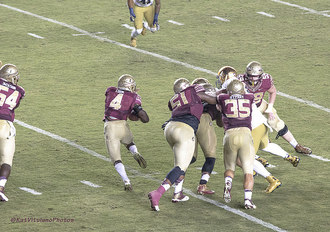
The saga, involving FSU cornerback P.J. Williams, is all too familiar. As my research for a column three years ago demonstrated, colleges and their
| | fans have been bending rules for football stars since the late 19th century. As early as 1895, the University of Chicago was enrolling stars in classes even though they hadn’t yet finished high school. In 1929, the Carnegie Foundation published what became known as “Bulletin 23,” which accused colleges of operating slush funds and breaking rules regarding recruiting. Even at the high school my children attended, Bingham High in South Jordan, Utah, a prosecutor transferred a star player’s armed robbery case from adult to juvenile court so the young man could still play for the University of Utah the next season, something the prosecutor told Sports Illustrated was influenced by the young man’s football scholarship. FSU, however, has become the poster child for bad behavior, and the Tallahassee police department seems to have a troubling history of overlooking things football players do around town. The evidence includes irregularities surrounding an alleged rape case involving FSU’s star player Jameis Winston, and an ignored case of domestic abuse involving another player. The New York Times investigated those cases, as well. The rest of us are left to wonder what might come to light if the Times investigated police reports in other college towns. While all this is coming to light, the National Labor Relations Board is still deliberating whether to let football players at Northwestern University organize a labor union. A regional office of the NLRB ruled earlier this year that the players are employees of the university and have a right to organize, and that decision is under review. The question is whether letting kids get paid, or receive other benefits aboveboard for playing college football, would change any of the bad behavior. Would it make players more accountable to their schools, or would it just intensify an already out-of-control situation? I vote for the latter. I think history casts the same vote. Nearly 30 years ago, the NCAA gave Southern Methodist University the “death penalty,” as it is called, for maintaining a slush fund used to pay players, among other things. Under the “death penalty,” the program was essentially dismantled. The school did not play a game for two seasons, and then it took 20 more years for it to be good enough again to qualify for a bowl game. Until the NCAA issues more “death penalties” for matters far worse than what SMU did, behaviors are not going to change. As I wrote in 2011, “Collegiate sports scandals may well be the canaries in the coal mine of American ethics. If Christianity teaches that we put our hearts where our treasures are, then touchdowns and slam-dunks have become precious booty, indeed. We shouldn’t be surprised that thieves will do all they can to get at those jewels.” Considering scandal after scandal for more than 100 years hasn’t changed anything, it’s naïve to think publicity alone will change anything. |

 RSS Feed
RSS Feed

